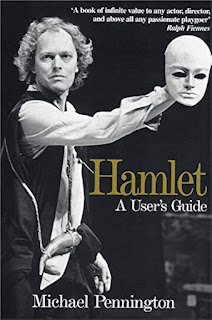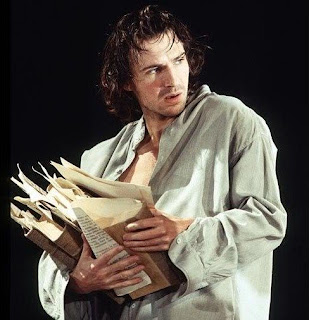 |
| Tom Cullinan, Brian Pedaci & me Backstage at the Brick Alley Theatre |
No, they were all poncy geeks and their friends were, too. The abuse that was heaped upon me was mental, literate snark. I would be mocked for existing, and god forbid I actually did or said anything stupid because I wouldn't only be ridiculed for the moment, there would be callbacks that went on for years.
As a result, I have always been extremely defensive about being made fun of, to the point of being no fun at all. I cannot take a joke, or at least I could not until I met my wife Toni who fills me with such confidence that I became a different person. This is true.
However, allow me to share a moment from my past when I was a complete noodge and ruined a great joke because of my insecurities. When we started Bad Epitaph Theater Company, I was determined that we present ourselves as professionally as possible.
That included, for example, that the program include the UK model of company bios, where they are not third person narratives but a list of previous work. Some grumbled, but I wasn't about to provide the audience a dozen paragraphs that all begin the same way, "So-and-so is thrilled to be part of this production!"
I also insisted upon a pre-recorded pre-show announcement, which was not the convention at the time. I provided sound designer Walter Mantani with this text to be played right before the show begins:
Good evening. Bad Epitaph Theater Company welcomes you to the Brick Alley Theatre. We hope you enjoy our performance, which will begin momentarily. First a few announcements. The production will last approximately three hours, with two, ten minute intermissions. Stage fog will be employed during the performance, and a firearm will be discharged onstage during the Second Act. Performers will be using the aisles for their entrances and exits. Please refrain from getting up or leaving the auditorium until an intermission. Out of courtesy for those around you, please refrain from having conversations during the performance, and if you have a cough or sore throat, you might like to take the time now to unwrap any throat lozenges or candy. Please take a moment and turn off any cellphones or pagers. Thank you for your attention, and enjoy the show.
Yes! We had content advisories in the twentieth century. Anyway, it was important information and Walter has such a beautiful, stentorian voice, I wanted it to be his, and not mine.
That recording was not played for the final dress for our first production, Hamlet, however. Instead, they played an alternate version. It was a joke, but I didn't think it was funny and was very direct with Marian, our stage manager, that it never be played again, that under no circumstances should it ever be played before any performance.
I mean, of course she wouldn't. It was a joke. For the company to enjoy. If it happened today, I would howl with laughter. At the time I took it all too seriously. Because I thought I was being made fun of.
So, anyway, here it is! I posted this on YouTube years ago, and people love it, it's gotten over eight thousand views which for me is a lot. Have a listen ... and enjoy the show!









.png)












.jpg)




.jpg)


.jpg)
.jpg)


.jpg)
.jpg)
.jpg)